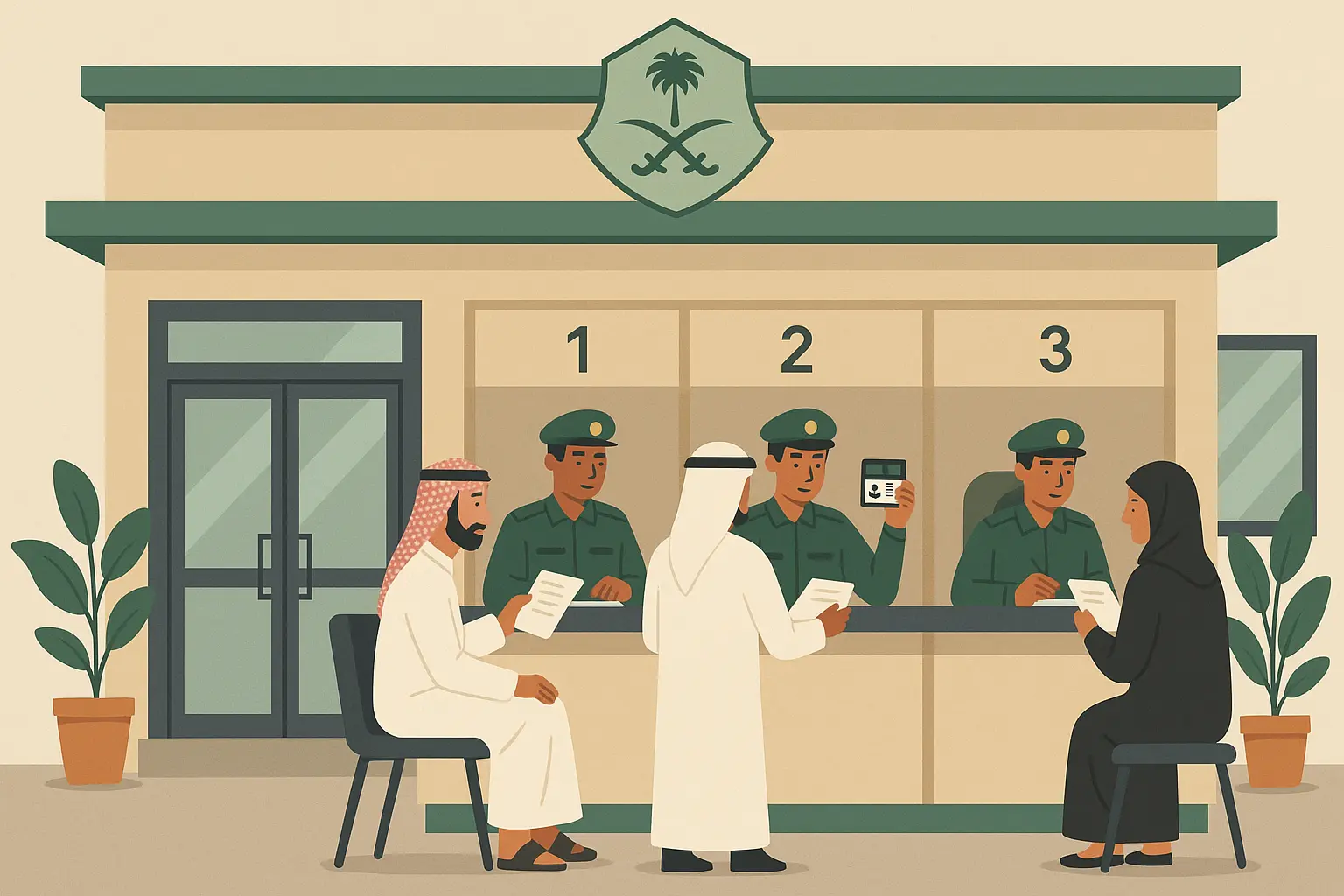Three years ago, I thought driving in Saudi Arabia was just about getting a license and finding any job that paid the bills. Boy, was I wrong. The transportation market here is exploding, and drivers who understand the game are making serious money – we’re talking SAR 6,000+ monthly for the right positions.
According to recent salary data, the average driver gross salary in Saudi Arabia is 62,791 SAR annually, with entry-level positions starting around 49,238 SAR per year and senior drivers earning up to 74,210 SAR annually. But those numbers don’t tell the whole story – the real money is in specialization and knowing which companies actually pay.
Table of Contents
-
Understanding the Current Driver Employment Market
-
Salary Breakdown: What You’ll Actually Earn
-
Specialized Positions That Actually Pay More
-
Getting Your Documentation Right
-
Building Your Career Beyond Basic Driving
-
Complete Compensation Packages
-
Technology and Market Changes
-
Your Action Plan for Landing Better Positions
-
How ValidGrad Can Help With Missing Documentation
-
Final Thoughts
TL;DR
-
Entry-level drivers start around SAR 2,500-3,200 monthly, while experienced drivers earn SAR 3,500-4,500
-
Specialized positions like truck driving (SAR 3,800-6,500) and executive chauffeurs (SAR 4,500-8,000) pay significantly more
-
Riyadh and Jeddah offer 15-20% higher salaries than smaller cities
-
Large companies typically pay 10-25% more than small businesses
-
Complete packages include overtime pay, medical insurance, housing allowances, and end-of-service benefits
-
Additional certifications can boost monthly earnings by SAR 300-600
-
Proper documentation and license conversion are essential for employment
-
Tourism and entertainment sectors are creating new high-paying opportunities
Understanding the Current Driver Employment Market
Look, I’ve been tracking this market for three years, and the changes are wild. Vision 2030 isn’t just government talk – it’s actually creating jobs. The logistics boom alone opened thousands of driving positions that didn’t exist when I started researching this.
But here’s what nobody tells you upfront: location changes everything. A driver in Riyadh earning SAR 4,500 might make SAR 3,200 doing the exact same job in Taif. It’s not just about cost of living – it’s about competition and demand.
According to “Economy Middle East”, Saudi Arabia’s growing economy is opening up job opportunities, with Vision 2030 serving as the driving force behind growth that has paved the way for businesses to expand in industries like healthcare, IT, engineering, education, and tourism, creating increased demand for both skilled and non-skilled workers.
Where the Money Actually Is
Riyadh and Jeddah aren’t just paying more because they can – they’re paying more because they have to. The competition for good drivers is fierce, and I’ve seen drivers relocate from smaller cities and immediately bump their monthly income by SAR 500-800 just by changing location.
The Eastern Province, particularly around Dammam and Khobar, offers interesting opportunities too. The industrial presence there means more specialized driving positions, especially for those willing to work with heavy equipment or in industrial settings.
Understanding regional salary differences is particularly important when considering average salary trends across Saudi Arabia, as drivers need to balance earning potential with living costs in different cities.
|
City |
Average Monthly Salary |
Cost of Living Index |
Opportunity Rating |
|---|---|---|---|
|
Riyadh |
SAR 3,800-4,500 |
High |
Excellent |
|
Jeddah |
SAR 3,600-4,300 |
High |
Excellent |
|
Dammam |
SAR 3,400-4,000 |
Medium |
Good |
|
Makkah |
SAR 3,200-3,800 |
Medium |
Good |
|
Taif |
SAR 2,800-3,400 |
Low |
Fair |
Company Size Matters More Than You Think
Large corporations mean structured pay scales and better benefits, though less room for negotiation. Small companies offer flexibility but often can’t compete on total compensation. Government positions? They’re not always the highest paying upfront, but the job security and end-of-service benefits can make them incredibly valuable long-term investments.
Take Ahmed (real guy I know): he jumped from a small transport company earning SAR 2,800 monthly with basic benefits to a large logistics corporation. His base salary increased to SAR 3,500, plus he received medical insurance for his family, housing allowance of SAR 800, and performance bonuses that added another SAR 400-600 monthly. His total compensation package increased by over 40%.
Salary Breakdown: What You’ll Actually Earn
Let’s cut through the fluff and talk real numbers. Entry-level drivers start around SAR 2,500-3,200 monthly, while experienced drivers earn SAR 3,500-4,500. But experience isn’t just about years behind the wheel – it’s about what you’ve learned and how you can prove it.
I’ve met drivers with ten years of experience still earning entry-level wages because they never documented their skills or sought advancement opportunities. Don’t be that guy.
The Reality of Starting Out
Starting at SAR 2,500 might feel low, but it’s actually reasonable when you factor in the learning curve. Most entry-level positions include training, and I’ve seen drivers move up to the SAR 3,000+ range within six months if they prove themselves reliable.
The key is treating your first position as paid training rather than your final destination. Document everything you learn, build relationships with supervisors, and always ask about advancement opportunities during your initial interviews.
The Three-Year Magic Number
Something changes at three years of experience. You’re no longer the new guy who needs constant guidance – you’re someone who can train others and handle difficult situations independently. Employers start viewing you differently, and that’s when the real earning potential kicks in.
Performance incentives at this level become substantial. I’ve seen experienced drivers earn an extra SAR 800-1,200 monthly through fuel efficiency bonuses, safety records, and customer satisfaction scores. These aren’t just nice-to-have extras; they’re significant income boosters that can push your total monthly earnings well above the base salary.
Based on SalaryExpert data, an entry level driver (1-3 years of experience) earns an average salary of 49,238 SAR annually, while a senior level driver (8+ years of experience) earns an average salary of 74,210 SAR annually, demonstrating the significant value of experience in the Saudi market.
Specialized Positions That Actually Pay More
Standard driving has its place, but specialization is where the real money lives. Not every driver can or wants to do these jobs, which is exactly why they pay more.
|
Specialization |
Monthly Salary Range |
Additional Requirements |
Growth Potential |
|---|---|---|---|
|
Executive Chauffeur |
SAR 4,500-8,000 |
Multilingual, Professional Appearance |
High |
|
Heavy Vehicle Driver |
SAR 3,800-6,500 |
Commercial License, Physical Fitness |
Medium |
|
Delivery Specialist |
SAR 3,200-4,800 |
Route Knowledge, Customer Service |
Medium |
|
Tourism Driver |
SAR 5,000-7,500 |
Cultural Knowledge, Languages |
Very High |
|
Security Transport |
SAR 4,200-6,800 |
Security Clearance, Training |
High |
Heavy Vehicle and Long-Distance Transport
Truck driving isn’t for everyone, but the money is undeniably better. The salary range of SAR 3,800-6,500 reflects the additional licensing requirements and the physical demands of the job. Long-distance routes pay even more because you’re essentially living on the road.
Cross-border driving to UAE, Kuwait, or other GCC countries can add SAR 500-1,200 monthly to your base salary. However, this requires additional documentation and often means being away from home for extended periods.
Executive and VIP Driving Services
Executive driving is a completely different world. You’re not just driving; you’re providing a premium service that requires discretion, professionalism, and often multilingual capabilities. The SAR 4,500-8,000 range reflects these additional requirements.
Recent opportunities highlight this growing demand. “Siasat” reported that the Indian Embassy in Riyadh announced a vacancy for the role of Chauffeur, requiring minimum 10th standard education, proficiency in English and Arabic, valid Saudi license with at least five years of experience, and candidates below 40 years of age.
Luxury vehicle operation bonuses might seem small at SAR 300-800 monthly, but they add up. More importantly, they demonstrate that you’re trusted with expensive equipment, which opens doors to even higher-paying positions.
Here’s a real success story: Khalid transitioned from regular taxi driving (SAR 3,000 monthly) to executive chauffeur services. He invested SAR 2,000 in professional appearance training and English language courses. Within eight months, he secured a position with a multinational company earning SAR 6,500 monthly, plus housing allowance and annual performance bonuses of SAR 3,000-5,000.
Tourism Driving – The Hidden Goldmine
Tourism driving combines transportation with hospitality services. You need cultural knowledge, language skills, and the ability to handle diverse international clients. The SAR 5,000-7,500 monthly range reflects these specialized requirements.
Entertainment and events transportation offers seasonal earning spikes that can significantly boost annual income. During major events or peak tourist seasons, daily rates can double or triple normal compensation. However, this work requires flexibility and stress management skills since you’re often working evenings, weekends, and holidays.
Getting Your Documentation Right
Boring but crucial – I’ve seen qualified drivers miss great opportunities over paperwork issues. Documentation might seem like a hassle, but it’s the foundation of everything else in your career.
Many driving positions, especially those with higher salaries, require educational verification alongside driving credentials. Understanding essential documents for employment can save weeks of delays in your job search process.
Essential Documents Checklist:
-
Valid passport with minimum 6 months validity
-
Original driving license from home country
-
Attested educational certificates
-
Medical fitness certificate
-
Previous employment letters with experience details
-
Professional translations (Arabic/English)
-
Passport-size photographs (white background)
-
Police clearance certificate
License Conversion Reality Check
License conversion isn’t just a formality – it’s often your first real test in the Saudi system. The medical examination is straightforward, but the driving test (if required) can be challenging if you’re not familiar with local traffic patterns and regulations.
Budget SAR 400-600 for the complete process, and don’t underestimate the time investment. Multiple visits to the traffic department are often necessary, so plan accordingly. Don’t schedule job interviews until this process is complete – employers won’t wait for you to sort out basic requirements.
Work Authorization and Legal Requirements
The Iqama process can be frustrating, but it’s non-negotiable. Most reputable employers will handle the sponsorship process, but you need to understand what’s required from your end. Medical examinations, background checks, and document attestations all take time.
Saudization policies are real and affecting the market. This doesn’t mean opportunities don’t exist for expatriate drivers, but it does mean you need to bring something special to the table – whether that’s specialized skills, language abilities, or experience with specific vehicle types.
Building Your Career Beyond Basic Driving
Career advancement isn’t automatic – you have to actively pursue it. The drivers earning the most money are those who’ve developed skills beyond just operating a vehicle.
Certifications That Actually Boost Your Pay
Defensive driving certification might cost you SAR 800-1,200 upfront, but it can add SAR 300-600 to your monthly salary. More importantly, it makes you eligible for positions with companies that require certified drivers for insurance purposes.
First aid certification is particularly valuable if you’re intereste
First aid certification is particularly valuable if you’re interested in executive driving or positions involving passenger transport. It’s not just about the salary bump – it’s about positioning yourself as a professional who takes safety seriously.
Professional Development That Matters:
-
Defensive driving certification
-
First aid/CPR training
-
Customer service skills course
-
Basic vehicle maintenance knowledge
-
Language proficiency certificates
-
Fleet management training
-
Safety protocols certification
-
GPS and technology proficiency
Fleet Management and Supervisory Opportunities
Fleet management represents the biggest earning jump available to experienced drivers. Moving from SAR 4,000 monthly as a senior driver to SAR 6,000-9,000 as a fleet coordinator is substantial, but it requires developing completely different skills.
You’ll need to understand logistics, basic accounting, and people management. Some companies offer internal training programs, but you can also pursue these skills independently through online courses or local training centers.
Here’s Mohammad’s progression: he started as a delivery driver earning SAR 3,200 monthly. He completed fleet management training during evenings and volunteered to help coordinate schedules during busy periods. After 18 months, he was promoted to Fleet Supervisor earning SAR 7,200 monthly, managing 25 drivers and 30 vehicles for a major logistics company.
Complete Compensation Packages
Base salary is just the starting point. The real value of any position lies in the complete package, and this is where many drivers make mistakes during job evaluation and negotiation.
What Actually Adds Up to Your Total Monthly Value
Overtime calculations can dramatically change your actual earnings. If you’re willing to work extra hours, that 150% rate can add SAR 800-1,500 to your monthly income. However, make sure you understand the company’s overtime policies before accepting any position.
Performance incentives vary widely between employers. Fuel efficiency bonuses, safety records, and customer satisfaction scores can add SAR 200-800 monthly. These might seem small individually, but they compound over time and can represent a significant portion of your total compensation.
Benefits That Add Real Value to Your Package
Medical insurance covering your family is worth SAR 200-400 monthly if you had to purchase it independently. When evaluating job offers, factor this into your total compensation calculation.
Housing allowances of SAR 800-1,500 monthly can make a significant difference in your quality of life. Some companies provide actual accommodation instead of allowances, which can be even more valuable depending on the quality and location.
End-of-service gratuity calculations follow Saudi labor law: half-month salary per year for the first five years, then full month per subsequent year. This isn’t just a nice bonus – it’s a substantial sum that grows over time and should influence your long-term career planning.
Technology and Market Changes Affecting Driver Jobs
Technology isn’t just changing how we drive – it’s changing what driving jobs exist and what skills employers value. Staying ahead of these changes is crucial for long-term career success.
New Opportunities in Digital Platforms
App-based driving platforms are creating new income streams, but they require different skills than traditional employment. You need to understand customer service, digital payment systems, and route optimization apps.
Tourism sector growth is creating specialized opportunities that didn’t exist before. Multilingual tour drivers earning SAR 5,000-7,500 monthly represent a completely new category of driving employment that combines transportation with hospitality services.
Entertainment and Events Transportation
Entertainment and events transportation offers seasonal earning spikes that can significantly boost annual income. During major events or peak tourist seasons, daily rates can double or triple normal compensation.
However, this work requires flexibility and stress management skills. You’re often working during evenings, weekends, and holidays when others are relaxing. The financial rewards can be substantial, but the lifestyle demands are real.
Your Action Plan for Landing Better Positions
Having a plan makes all the difference between randomly applying for jobs and strategically building your career. Here’s what actually works based on real market experience.
Phase 1: Documentation and Preparation
Start with documentation because everything depends on it. Gather your passport, existing driving license, educational certificates, medical certificates, and previous employment letters. Get official translations for anything not in Arabic or English.
The license conversion process requires patience. Budget SAR 400-600 for fees and plan for multiple visits to the traffic department. Don’t schedule job interviews until this process is complete – employers won’t wait for you to sort out basic requirements.
If you’ve lost important educational documents during your move to Saudi Arabia, services for replacing a lost diploma can help ensure you have complete documentation packages for better job opportunities.
Phase 2: Strategic Job Search
Use Bayt.com, GulfTalent, and LinkedIn Saudi Arabia, but don’t rely on them exclusively. Visit company websites directly because many of the best positions are never posted on job boards.
Prepare for practical driving tests because most employers will test your actual driving skills. Practice defensive driving techniques, learn major routes in your target city, and review Saudi traffic laws. This preparation often determines whether you get the job, regardless of your experience level.
Job Search Strategy That Works:
-
Create profiles on major job platforms
-
Research target companies directly
-
Network with current drivers in your area
-
Prepare for practical driving assessments
-
Update CV with Saudi-specific formatting
-
Practice interview questions in Arabic/English
-
Gather reference contacts from previous employers
-
Research salary ranges for target positions
Phase 3: Salary Negotiation That Actually Works
Salary negotiation isn’t about being aggressive – it’s about being informed and professional. Research market rates using salary surveys, networking contacts, and online resources. When you walk into negotiations with specific data about what similar positions pay, employers take you seriously.
Don’t just say “I want more money” – explain why your skills and experience justify a specific compensation range. Present your value proposition clearly by highlighting multilingual abilities, clean driving record, customer service experience, or specialized vehicle operation.
Consider the complete package rather than focusing solely on base salary. Sometimes a lower base salary with better overtime opportunities, housing allowances, or advancement potential offers more long-term value than a higher starting wage with no growth prospects.
How ValidGrad Can Help With Missing Documentation
Career advancement often hits unexpected roadblocks, and missing educational documentation is one of the most frustrating. I’ve seen qualified drivers miss out on fleet management positions or executive chauffeur roles simply because they couldn’t provide proof of their educational background.
ValidGrad’s diploma and transcript replacement services solve this problem quickly and professionally. Whether you’ve lost important certificates that employers require for advanced positions, or need backup copies for multiple job applications, their quick turnaround time ensures you never miss opportunities due to incomplete paperwork.
Corporate environments and specialized roles increasingly require educational verification alongside driving credentials. Fleet management positions earning SAR 6,000-9,000 monthly often require proof of education completion, and ValidGrad’s professional-quality replacement documents help you maintain competitive application packages.
For drivers who need to understand more about replacement diplomas or want to learn how to get a diploma replacement, ValidGrad provides comprehensive solutions that meet Saudi employer requirements.
Don’t let missing educational documents limit your career advancement. Visit ValidGrad today to get your replacement diplomas and transcripts, ensuring you’re ready for every opportunity in Saudi Arabia’s growing transportation market.
Final Thoughts
The Saudi transportation market offers real career paths with clear advancement from entry-level positions to specialized roles earning SAR 6,000+ monthly. Success requires proper documentation, continuous skill development, and understanding of market dynamics, but the financial rewards and career stability make the effort worthwhile for dedicated professionals.
What strikes me most after three years of tracking this market is how much it’s evolved. This isn’t just about getting from point A to point B anymore – it’s become a legitimate career path with genuine advancement opportunities and compensation that reflects the skill and responsibility involved.
Your success won’t depend on luck or connections alone. It’ll come from understanding the market, preparing properly, and positioning yourself for opportunities that match your skills and ambitions. Whether you’re starting at SAR 2,500 monthly or aiming for those SAR 8,000+ executive positions, the pathway exists if you’re willing to follow it systematically.
The documentation requirements might seem overwhelming initially, but they’re your foundation for everything else. The continuous learning and certification might require time and money upfront, but they’re investments that pay dividends throughout your career.
Most importantly, don’t underestimate the value of what you do. Professional drivers keep Saudi Arabia’s economy moving, and the market is finally recognizing that with compensation packages that reflect the skill and responsibility involved. The opportunities are there – now it’s about positioning yourself to take advantage of them.









